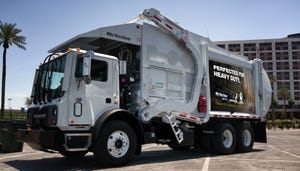legislation: Is Repetitive Stress a Disorder or Disability?
December 1, 1997
Alfred Richardson (not his real name) lost a chance to get a higher paying job after his company, which owns and operates landfills, transfer stations and recycling centers, determined he was a risk for wrist injury.
Richardson says he never suffers pain in his hands when he works around the house or when he plays golf not even while at his second job as a supermarket check-out clerk.
Still, Richardson was denied a promotion three years ago in the maintenance department at a waste management facility after company doctors diagnosed a case of carpal tunnel syndrome.
"I don't see how they could decide that," Richardson says. "I never had any pain."
Richardson's case is part of a trend among employers in labor-intensive businesses to screen job applicants for possible hand and wrist injuries and to check for conditions generally referred to as repetitive stress injuries.
Such injuries are associated with manual tasks involving repetition, using jackhammers or working on assembly lines. One such disorder, carpal tunnel syndrome, is a debilitating condition of the hand, arm and wrist that affects millions of workers, including those who work at computers all day.
Some employers require job applicants to undergo qualifying medical exams that include measurement of nerve impulses in the hands and wrists. Often, the companies use the test results to place workers who seem prone to repetitive stress injuries in lower-risk jobs. Sometimes, however, the employers withdraw job offers altogether, say lawyers for workers.
Do such tests violate the rights of job applicants under the Americans with Disabilities Act (ADA)? No, says the Equal Employment Opportunity Commission (EEOC). Employers can require physical examinations of applicants as long as they are conducted after an offer is made.
The problem is how employers use the results. If an employer can prove that a candidate cannot do a job even with reasonable accommodations, or if the applicant poses a "direct threat" to himself or others, the offer can be withdrawn.
However, if repetitive strain constitutes a disability, rather than an ailment or injury, then the employer has a problem. In such a case, excluding workers with diagnosed repetitive stress injuries would violate the ADA. In the coming years, the courts are expected to define the nature of repetitive stress disorders. Even where repetitive stress is not a disability, employers still have to show that they are trying to evaluate each applicant's abilities, and not automatically excluding all individuals who might have the condition.
"Anyone who doesn't do pre-employment testing for carpal tunnel syndrome is setting himself up for a lawsuit," says a human resources and safety supervisor at a manufacturing firm.
Many companies are turning to specialists in occupational medicine who help screen job applicants and assist in workers' compensation cases.
One popular diagnostic method sends electronic impulses to points in the hands and wrists. If the speed of the impulses is too slow, then the person is said to be likely to develop repetitive stress injury.
Critics say electronic stimulus testing is a poor way to gauge the potential for repetitive strain. "We have published data that say this type of test procedure has no such validity," says Dr. Alfred Franzblau`, associate professor of occupational medicine at the University of Michigan, Ann Arbor. He and other physicians have written papers on how electronic stimulus tests can show signs of repetitive stress when none exists. He also has found that such tests sometimes do not detect actual repetitive strain.
Two years ago, the EEOC filed a lawsuit on behalf of 110 job seekers at a Rockwell International plant in Illinois. The applicants say Rockwell violated the ADA by rejecting them based on electronic repetitive stress tests.
No trial date has been scheduled in the lawsuit, which is not a class action.
OMB Announces New Procurement Rules The office of Management and Budget (OMB), Washington, D.C., has announced new federal contract procurement rules that make it easier for agencies and departments to cut back on the number of bidders earlier in the process, according to World Wastes Legal Editor Barry Shanoff.
Arguably, the new system may help small businesses save time and money if they ultimately don't have much chance of securing a contract, says the OMB. The U.S. Chamber of Commerce opposes the change, noting its potential to limit competition, invite favoritism and foster less accountability.
SITA-BFI Forge Billion Dollar Alliance PARIS - In a coup to dominate Europe, SITA, a subsidiary of Paris-based Suez Lyonnaise des Eaux, signed an agreement with Browning-Ferris Industries (BFI) to acquire the Houston-based company's assets outside of North America.
The agreement, signed on November 10, 1997, between BFI and SITA, a international waste services company, positions its parent company as Europe's leading waste services provider and gives it a strong foothold in both the Asia-Pacific region and in Latin America.
The transaction, which is expected to close by the end of the first quarter of 1998 and is valued at $1.45 billion, will be paid in $1 billion cash and in shares of SITA stock. The SITA shares will grant BFI a 20 percent stake in the company. The cash payment will be financed through a loan of $600 million and an equity offering of $400 million, which will be fully underwritten by Suez Lyonnaise des Eaux, an international private infrastructure services group with $33 billion in revenues.
"The global partnership with Suez Lyonnaise des Eaux [continues BFI's strategy of focusing] on our core North American business while participating in the growth of the global environmental services industry," says Bruce E. Ranck, BFI's president and CEO.
BFI, the second-largest North American waste services group, will use the transaction's proceeds to continue its financial strategy to pay down debt and buy back equity. Additionally, as a result of this transaction and its recent streamlining of North American operations, BFI reports that it will accelerate an external growth strategy.
The SITA-BFI alliance makes the combined entity the largest waste services company in Europe, with projected annual revenues of nearly $2.8 billion. It also positions Suez Lyonnaise des Eaux, which holds more than a 50 percent stake in SITA, as the third-largest waste services company in the world.
Upon the transaction's completion, SITA will be an industry leader in France, the United Kingdom, the Netherlands, Germany, Spain and Brazil. The alliance also will bolster SITA's operations in Sweden, Italy, Portugal, Finland and Switzerland.
"We are confident in the continued success of our waste services business, which will represent approximately 19 percent of our total consolidated revenues and 13 percent of the cash flow generated by our core businesses," says Suez Lyonnaise des Eaux CEO Gerard Mestrallet.
The transaction will produce cost savings for SITA of more than FF200 million by the year 2000. It will be accredited to earnings for Suez Lyonnaise des Eaux and SITA as of 1999.
About the Author(s)
You May Also Like




